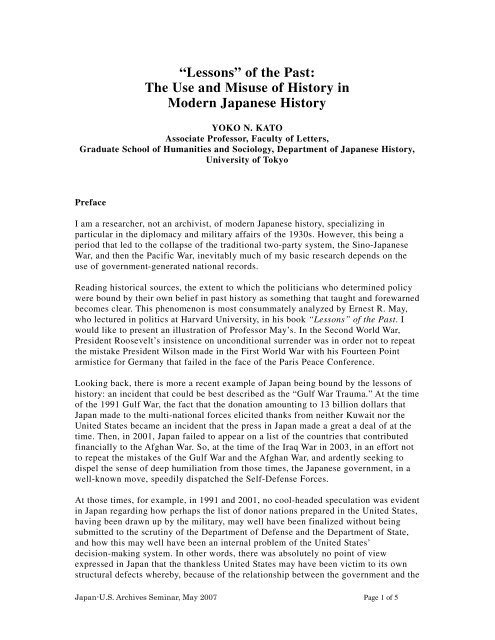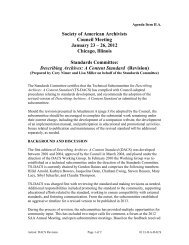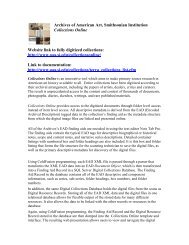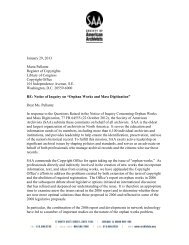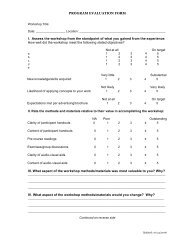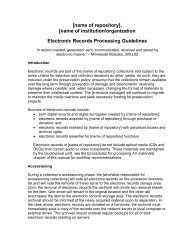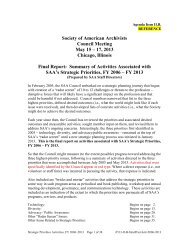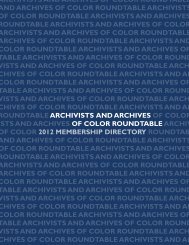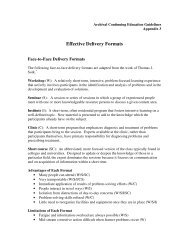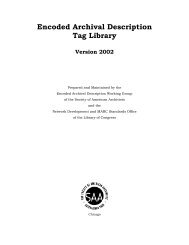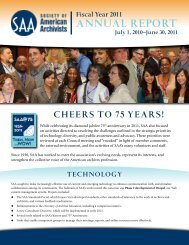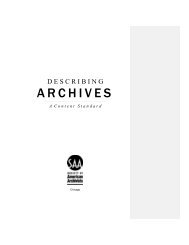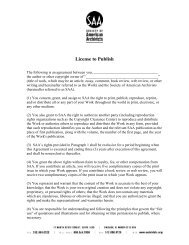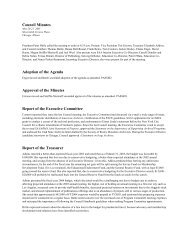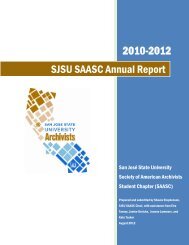The Use and Misuse of History in Modern Japanese History
The Use and Misuse of History in Modern Japanese History
The Use and Misuse of History in Modern Japanese History
You also want an ePaper? Increase the reach of your titles
YUMPU automatically turns print PDFs into web optimized ePapers that Google loves.
“Lessons” <strong>of</strong> the Past:<br />
<strong>The</strong> <strong>Use</strong> <strong>and</strong> <strong>Misuse</strong> <strong>of</strong> <strong>History</strong> <strong>in</strong><br />
<strong>Modern</strong> <strong>Japanese</strong> <strong>History</strong><br />
YOKO N. KATO<br />
Associate Pr<strong>of</strong>essor, Faculty <strong>of</strong> Letters,<br />
Graduate School <strong>of</strong> Humanities <strong>and</strong> Sociology, Department <strong>of</strong> <strong>Japanese</strong> <strong>History</strong>,<br />
University <strong>of</strong> Tokyo<br />
Preface<br />
I am a researcher, not an archivist, <strong>of</strong> modern <strong>Japanese</strong> history, specializ<strong>in</strong>g <strong>in</strong><br />
particular <strong>in</strong> the diplomacy <strong>and</strong> military affairs <strong>of</strong> the 1930s. However, this be<strong>in</strong>g a<br />
period that led to the collapse <strong>of</strong> the traditional two-party system, the S<strong>in</strong>o-<strong>Japanese</strong><br />
War, <strong>and</strong> then the Pacific War, <strong>in</strong>evitably much <strong>of</strong> my basic research depends on the<br />
use <strong>of</strong> government-generated national records.<br />
Read<strong>in</strong>g historical sources, the extent to which the politicians who determ<strong>in</strong>ed policy<br />
were bound by their own belief <strong>in</strong> past history as someth<strong>in</strong>g that taught <strong>and</strong> forewarned<br />
becomes clear. This phenomenon is most consummately analyzed by Ernest R. May,<br />
who lectured <strong>in</strong> politics at Harvard University, <strong>in</strong> his book “Lessons” <strong>of</strong> the Past. I<br />
would like to present an illustration <strong>of</strong> Pr<strong>of</strong>essor May’s. In the Second World War,<br />
President Roosevelt’s <strong>in</strong>sistence on unconditional surrender was <strong>in</strong> order not to repeat<br />
the mistake President Wilson made <strong>in</strong> the First World War with his Fourteen Po<strong>in</strong>t<br />
armistice for Germany that failed <strong>in</strong> the face <strong>of</strong> the Paris Peace Conference.<br />
Look<strong>in</strong>g back, there is more a recent example <strong>of</strong> Japan be<strong>in</strong>g bound by the lessons <strong>of</strong><br />
history: an <strong>in</strong>cident that could be best described as the “Gulf War Trauma.” At the time<br />
<strong>of</strong> the 1991 Gulf War, the fact that the donation amount<strong>in</strong>g to 13 billion dollars that<br />
Japan made to the multi-national forces elicited thanks from neither Kuwait nor the<br />
United States became an <strong>in</strong>cident that the press <strong>in</strong> Japan made a great a deal <strong>of</strong> at the<br />
time. <strong>The</strong>n, <strong>in</strong> 2001, Japan failed to appear on a list <strong>of</strong> the countries that contributed<br />
f<strong>in</strong>ancially to the Afghan War. So, at the time <strong>of</strong> the Iraq War <strong>in</strong> 2003, <strong>in</strong> an effort not<br />
to repeat the mistakes <strong>of</strong> the Gulf War <strong>and</strong> the Afghan War, <strong>and</strong> ardently seek<strong>in</strong>g to<br />
dispel the sense <strong>of</strong> deep humiliation from those times, the <strong>Japanese</strong> government, <strong>in</strong> a<br />
well-known move, speedily dispatched the Self-Defense Forces.<br />
At those times, for example, <strong>in</strong> 1991 <strong>and</strong> 2001, no cool-headed speculation was evident<br />
<strong>in</strong> Japan regard<strong>in</strong>g how perhaps the list <strong>of</strong> donor nations prepared <strong>in</strong> the United States,<br />
hav<strong>in</strong>g been drawn up by the military, may well have been f<strong>in</strong>alized without be<strong>in</strong>g<br />
submitted to the scrut<strong>in</strong>y <strong>of</strong> the Department <strong>of</strong> Defense <strong>and</strong> the Department <strong>of</strong> State,<br />
<strong>and</strong> how this may well have been an <strong>in</strong>ternal problem <strong>of</strong> the United States’<br />
decision-mak<strong>in</strong>g system. In other words, there was absolutely no po<strong>in</strong>t <strong>of</strong> view<br />
expressed <strong>in</strong> Japan that the thankless United States may have been victim to its own<br />
structural defects whereby, because <strong>of</strong> the relationship between the government <strong>and</strong> the<br />
Japan-U.S. Archives Sem<strong>in</strong>ar, May 2007 Page 1 <strong>of</strong> 5
military, a policy was decided on that reflected the military’s dom<strong>in</strong>ance.<br />
Evident here is how when politicians <strong>and</strong> peoples look to history for lessons, they are<br />
swayed by those cases they remember <strong>and</strong> arbitrarily select from that narrow b<strong>and</strong> <strong>of</strong><br />
examples those that they decide to use as their “history.” Over <strong>and</strong> over aga<strong>in</strong>,<br />
politicians <strong>and</strong> peoples misuse history. My lecture today borrows its title largely from<br />
Pr<strong>of</strong>essor May’s book, but I will address here the issues I have just <strong>in</strong>troduced.<br />
<strong>The</strong> Problem <strong>of</strong> Self-Awareness <strong>in</strong> the Authors <strong>of</strong> State Documents<br />
I have just outl<strong>in</strong>ed how politicians <strong>and</strong> peoples, when fram<strong>in</strong>g future policies,<br />
cont<strong>in</strong>ually misuse history. However, I would like to address examples <strong>of</strong> an issue that<br />
precedes how history is used, that is, what happens at the stage when history is written,<br />
<strong>and</strong> about the people who wrote <strong>and</strong> preserved the national records. Surely it is there<br />
that the problem beg<strong>in</strong>s.<br />
<strong>The</strong> 30-year rule observed <strong>in</strong> Western archives whereby archives are opened after 30<br />
years is the general one. However, <strong>in</strong> Japan, if access is sought even to documents <strong>in</strong><br />
the national archives relat<strong>in</strong>g to political decisions made <strong>in</strong> the 1970s, access is not<br />
possible. <strong>The</strong> problem <strong>of</strong> the national archives not hav<strong>in</strong>g sufficiently archived even<br />
important post-war documents came to light with the 2001 Information Disclosure Act<br />
whereby the national archives were established as an <strong>in</strong>dependent adm<strong>in</strong>istrative<br />
<strong>in</strong>stitution, each government m<strong>in</strong>istry tak<strong>in</strong>g over its functions. Not only had archiv<strong>in</strong>g<br />
been <strong>in</strong>sufficient, but with the transfer to the m<strong>in</strong>istries <strong>of</strong> archiv<strong>in</strong>g authority, what<br />
had been a flow <strong>of</strong> documents to the national archives from the m<strong>in</strong>istries <strong>of</strong> over<br />
17,000 volumes per year dropped alarm<strong>in</strong>gly to a mere 674 <strong>in</strong> the space <strong>of</strong> a year.<br />
It is therefore impossible to verify <strong>in</strong> the future the mean<strong>in</strong>g <strong>of</strong> those important<br />
decisions reached by policy makers <strong>of</strong> the past; neither can use be made <strong>of</strong> critically<br />
<strong>in</strong>formed selections <strong>of</strong> history. While he can not be said to represent the whole<br />
government, Yasuo Fukuda, the Chief Cab<strong>in</strong>et Secretary <strong>in</strong> 2003, <strong>in</strong> an encourag<strong>in</strong>g<br />
move <strong>in</strong> that year, accepted the seriousness <strong>of</strong> the problem <strong>and</strong> established a<br />
Commission on the Management, Archiv<strong>in</strong>g <strong>and</strong> <strong>Use</strong> <strong>of</strong> State Documents, peopled it<br />
with key figures, <strong>and</strong> expounded on the nature <strong>of</strong> the problem. Along with specialists<br />
on the Information Disclosure Act, lawyers, specialists <strong>in</strong> adm<strong>in</strong>istrative law, <strong>and</strong> the<br />
head <strong>of</strong> the national archives, I, too, took part <strong>in</strong> the Commission. It was, I believe, for<br />
this reason that I was asked to give a keynote lecture at this conference.<br />
Much was discussed by the Commission. In these discussions, a comparison <strong>of</strong> Japan’s<br />
archives with those around the world quickly made it clear what the problems were.<br />
<strong>The</strong>y can be summed up <strong>in</strong> five po<strong>in</strong>ts.<br />
1. Japan has no law correspond<strong>in</strong>g to laws <strong>in</strong> foreign countries regard<strong>in</strong>g the<br />
archiv<strong>in</strong>g <strong>of</strong> documents that are made <strong>in</strong>to law; for example, the United States’<br />
Code Title 44 - Public Pr<strong>in</strong>t<strong>in</strong>g <strong>and</strong> Documents, <strong>and</strong> similar laws <strong>in</strong> the Republic<br />
<strong>of</strong> Korea, Ch<strong>in</strong>a, <strong>and</strong> Canada, amongst others.<br />
2. <strong>The</strong> absence <strong>of</strong> any agency supervis<strong>in</strong>g <strong>and</strong> direct<strong>in</strong>g the archiv<strong>in</strong>g <strong>of</strong> national<br />
records presently <strong>in</strong> use by government organs.<br />
Japan-U.S. Archives Sem<strong>in</strong>ar, May 2007 Page 2 <strong>of</strong> 5
3. <strong>The</strong> absence <strong>of</strong> any agency to screen <strong>and</strong> approve the disposal <strong>of</strong> documents.<br />
4. <strong>The</strong> lack <strong>of</strong> any right on the part <strong>of</strong> the national archives to determ<strong>in</strong>e which<br />
documents should be transferred to it when documents are transferred to it from<br />
m<strong>in</strong>istries.<br />
5. <strong>The</strong> lack <strong>of</strong> a system <strong>of</strong> tra<strong>in</strong><strong>in</strong>g for specialist staff to h<strong>and</strong>le historical archives<br />
<strong>and</strong> national records <strong>in</strong> a specialized manner.<br />
Each <strong>of</strong> these five po<strong>in</strong>ts approaches, I believe, the core <strong>of</strong> the problem. However, I<br />
feel that at the time <strong>of</strong> creat<strong>in</strong>g national records, it is important that those creat<strong>in</strong>g<br />
them <strong>and</strong> those execut<strong>in</strong>g that policy have the k<strong>in</strong>d <strong>of</strong> self-awareness I will discuss<br />
below that acknowledges the actor’s own part <strong>in</strong> the policy decision, <strong>and</strong> realizes the<br />
overwhelm<strong>in</strong>g basic duty he or she has to the people <strong>and</strong> the state to leave a full <strong>and</strong><br />
accurate record <strong>of</strong> the policy <strong>and</strong> the process it follows from its draft<strong>in</strong>g, to its<br />
confirmation, through to its execution.<br />
At the present day, the process <strong>of</strong> draft<strong>in</strong>g <strong>and</strong> negotiat<strong>in</strong>g policy via electronic media<br />
has become very much the norm. As people experience <strong>in</strong> the course <strong>of</strong> daily life — to<br />
the po<strong>in</strong>t <strong>of</strong> not actually be<strong>in</strong>g conscious <strong>of</strong> it — constant negotiation with numerous<br />
people via electronic media, e-mail, <strong>and</strong> the like makes last<strong>in</strong>g documentation <strong>of</strong><br />
processes such as the revision <strong>of</strong> documents very difficult. Compared to the Showa era<br />
(1926–1989) <strong>and</strong> <strong>of</strong> course the Meiji era (1868–1912), the present age is without a<br />
doubt go<strong>in</strong>g to be judged the most difficult by future generations when it comes to<br />
underst<strong>and</strong><strong>in</strong>g the processes by which policy was formulated.<br />
This be<strong>in</strong>g the case, I believe it more important than ever that those draft<strong>in</strong>g policy are<br />
able to be aware when creat<strong>in</strong>g documents that these records will <strong>in</strong> the future be<br />
transferred to the national archives <strong>and</strong> stored there. Such documents should be created<br />
based on this awareness. However, try<strong>in</strong>g to <strong>in</strong>duce self-awareness <strong>in</strong> people seems<br />
less a task for the historian than for those concerned with morality.<br />
As historians, all we can do is approach the historical sources, consider the various<br />
movements <strong>of</strong> forces that went <strong>in</strong>to mak<strong>in</strong>g them, <strong>and</strong> ask how accurately they record<br />
what happened. To address this po<strong>in</strong>t, I would like to discuss the case <strong>of</strong> the Ganghwa<br />
Isl<strong>and</strong> Incident. Look<strong>in</strong>g at it over the long term, the fabrication <strong>of</strong> historical sources<br />
left quite a large impr<strong>in</strong>t on the historical consciousness <strong>of</strong> succeed<strong>in</strong>g generations.<br />
This <strong>in</strong>fluence was by no means necessarily a good one, <strong>and</strong> <strong>in</strong> many ways was to<br />
Japan’s detriment.<br />
<strong>The</strong> Ganghwa Isl<strong>and</strong> Incident — An Amendment Conscious <strong>of</strong> the Great Powers’<br />
Scrut<strong>in</strong>y<br />
<strong>The</strong> concealment <strong>of</strong> <strong>in</strong>convenient facts potentially detrimental to one’s grip on power<br />
is a practice that wielders <strong>of</strong> political power have <strong>in</strong>dulged <strong>in</strong> all ages <strong>and</strong> countries.<br />
Japan is no exception. However, after the Russo-<strong>Japanese</strong> War, such behavior <strong>in</strong> Japan<br />
took on a particular characteristic. On the one h<strong>and</strong>, Japan’s victory made possible its<br />
abrogation <strong>of</strong> the Unequal Treaties while on the other it assumed the role <strong>of</strong> ruler <strong>of</strong><br />
Asia. Yet, at no time could Japan fail to rema<strong>in</strong> aware <strong>of</strong> be<strong>in</strong>g under the scrut<strong>in</strong>y <strong>of</strong><br />
Japan-U.S. Archives Sem<strong>in</strong>ar, May 2007 Page 3 <strong>of</strong> 5
the Great Powers. Japan was rewrit<strong>in</strong>g the facts <strong>of</strong> history from the po<strong>in</strong>t <strong>of</strong> view <strong>of</strong><br />
hav<strong>in</strong>g to expla<strong>in</strong> them to the Great Powers. <strong>The</strong> Ganghwa Isl<strong>and</strong> Incident is one such<br />
example.<br />
This <strong>in</strong>cident was recorded <strong>in</strong> <strong>Japanese</strong> high school textbooks <strong>and</strong> the like as be<strong>in</strong>g one<br />
that took place <strong>in</strong> September 1875 when the capta<strong>in</strong> <strong>of</strong> the <strong>Japanese</strong> naval vessel, the<br />
Unyo, seek<strong>in</strong>g dr<strong>in</strong>k<strong>in</strong>g water, tried to l<strong>and</strong> a ship’s boat without notice on Ganghwa<br />
Isl<strong>and</strong>. <strong>The</strong> Koreans shelled the boat, so once the capta<strong>in</strong> had returned to the vessel, the<br />
<strong>Japanese</strong> shelled the Korean battery. <strong>The</strong> <strong>Japanese</strong> government used this as a pretext to<br />
pressure the Koreans the next year <strong>in</strong>to open<strong>in</strong>g their country, <strong>and</strong> <strong>in</strong> which it<br />
succeeded.<br />
<strong>The</strong> ma<strong>in</strong> po<strong>in</strong>ts <strong>of</strong> this account are<br />
1. that the l<strong>and</strong><strong>in</strong>g was <strong>in</strong> search <strong>of</strong> water, <strong>and</strong><br />
2. that the number three battery on Ganghwa Isl<strong>and</strong> began fir<strong>in</strong>g on the naval<br />
vessel Unyo that was fly<strong>in</strong>g the <strong>Japanese</strong> flag.<br />
This is from the account <strong>of</strong> the <strong>in</strong>cident recorded <strong>in</strong> the historical document known as<br />
the “Kobun Roku” held <strong>in</strong> the national archives, <strong>and</strong> was based on the report written by<br />
the capta<strong>in</strong> <strong>of</strong> the Unyo dated October 8, 1875. In other words, this is what was<br />
recorded <strong>in</strong> the actual report composed at that time.<br />
However, thanks to a discovery <strong>of</strong> a certa<strong>in</strong> historical resource by Jun Suzuki, an<br />
associate pr<strong>of</strong>essor at the University <strong>of</strong> Tokyo’s Department <strong>of</strong> Literature, it became<br />
clear that the actual report <strong>of</strong> the Unyo’s capta<strong>in</strong>, dated October 8, had been amended<br />
to change the facts recorded on it. A detailed account <strong>of</strong> this is available by read<strong>in</strong>g<br />
Pr<strong>of</strong>essor Suzuki’s article, “Capta<strong>in</strong> <strong>of</strong> the Unyo, Yoshika Inoue’s September 29, 1875,<br />
Report <strong>of</strong> the Ganghwa Isl<strong>and</strong> Incident,” <strong>in</strong> No.12, Series 111, <strong>of</strong> the Shigaku Zasshi.<br />
In actual fact, the capta<strong>in</strong> <strong>of</strong> the Unyo, Inoue, made a first report dated September 28<br />
— <strong>and</strong> thus dated considerably earlier than October 8. In this first report, there was no<br />
mention <strong>of</strong> hav<strong>in</strong>g sent out a boat from the ship for the purpose <strong>of</strong> f<strong>in</strong>d<strong>in</strong>g dr<strong>in</strong>kable<br />
water. <strong>The</strong> report clearly states that the aim <strong>of</strong> the l<strong>and</strong><strong>in</strong>g was “to conduct a survey<br />
<strong>and</strong> meet with the local adm<strong>in</strong>istrator to <strong>in</strong>quire after various matters.” <strong>The</strong> aim <strong>of</strong><br />
survey<strong>in</strong>g Ganghwa Isl<strong>and</strong> <strong>and</strong> conduct<strong>in</strong>g an <strong>in</strong>vestigation <strong>of</strong> the surround<strong>in</strong>g area is<br />
not concealed. In Inoue’s m<strong>in</strong>d there would have been no need to conceal such actions<br />
as l<strong>and</strong><strong>in</strong>g to conduct surveys <strong>and</strong> talk with the local adm<strong>in</strong>istrator.<br />
Also, one more th<strong>in</strong>g about the first report is that it did not conceal the fact that the<br />
Koreans’ fir<strong>in</strong>g on the Unyo as it flew the <strong>Japanese</strong> flag happened only after the Unyo<br />
fired on them. It was Inoue’s superior, Sukemaro Ito, who made the amendments to the<br />
first report. On present<strong>in</strong>g the report to the M<strong>in</strong>ister <strong>of</strong> the Navy, Sumiyoshi Kawamura,<br />
Ito rewrote it <strong>in</strong> two places.<br />
<strong>The</strong> reason Ito amended the first report to read that Japan had ended up be<strong>in</strong>g fired<br />
upon after sett<strong>in</strong>g out to survey Korea’s important batteries was to awaken the<br />
vigilance <strong>of</strong> the Great Powers, <strong>and</strong> because he considered the <strong>Japanese</strong> act illegal from<br />
the po<strong>in</strong>t <strong>of</strong> view <strong>of</strong> the <strong>in</strong>ternational law <strong>of</strong> the day. <strong>The</strong> report with Ito’s amendments<br />
is the one that was <strong>in</strong>cluded <strong>in</strong> the “Kobun Roku”, from there to be <strong>in</strong>cluded <strong>and</strong><br />
Japan-U.S. Archives Sem<strong>in</strong>ar, May 2007 Page 4 <strong>of</strong> 5
published <strong>in</strong> the “<strong>Japanese</strong> Diplomatic Documents.” This was <strong>in</strong> 1940, <strong>and</strong> shows how<br />
long Japan has clung to the belief that Korea was wrong <strong>in</strong> shell<strong>in</strong>g a <strong>Japanese</strong> ship<br />
that was seek<strong>in</strong>g water <strong>and</strong> fly<strong>in</strong>g the <strong>Japanese</strong> flag.<br />
Somehow, with the gift <strong>of</strong> papers left beh<strong>in</strong>d by Ito to the Library <strong>of</strong> the National<br />
Institute for Defense Studies <strong>of</strong> the Defense Agency <strong>in</strong> 1964, the truth has managed to<br />
survive. However, until the publication <strong>of</strong> Pr<strong>of</strong>essor Suzuki’s thesis, that truth lay<br />
dormant. So when read<strong>in</strong>g modern <strong>Japanese</strong> historical sources, it is necessary take care<br />
<strong>and</strong> rema<strong>in</strong> aware <strong>of</strong> these examples <strong>of</strong> history rewritten by those <strong>of</strong> that time for the<br />
purpose <strong>of</strong> elim<strong>in</strong>at<strong>in</strong>g contradictions between what really happened <strong>and</strong> the way it<br />
was believed the Great Powers should be made to th<strong>in</strong>k th<strong>in</strong>gs happened, as well as<br />
between what really happened <strong>and</strong> what it was believed was admissible by<br />
<strong>in</strong>ternational law.<br />
Conclusion<br />
<strong>The</strong> <strong>Japanese</strong>, on the one h<strong>and</strong>, sought <strong>in</strong>dependence from the Great Powers, <strong>and</strong> on<br />
the other h<strong>and</strong>, sought to break away from Asia. <strong>The</strong>refore, on the one h<strong>and</strong>, they<br />
rema<strong>in</strong>ed ever conscious <strong>of</strong> be<strong>in</strong>g scrut<strong>in</strong>ized by the Great Powers, while, on the other,<br />
they themselves looked down on Asia. It should never be forgotten that these tw<strong>in</strong><br />
orientations <strong>in</strong> modern <strong>Japanese</strong> history exercised a great <strong>in</strong>fluence over, <strong>and</strong> restricted,<br />
the policy makers who left historical sources beh<strong>in</strong>d them. Also, it is important that<br />
today's <strong>Japanese</strong> consider what the modern equivalents might be <strong>of</strong> the scrut<strong>in</strong>y <strong>of</strong> the<br />
Great Powers <strong>and</strong> the contempt for Asia that characterized pre-war Japan.<br />
<strong>The</strong> Commission mentioned above presented two reports to the Cab<strong>in</strong>et. <strong>The</strong> content <strong>of</strong><br />
them can be seen on the Cab<strong>in</strong>et website; but I would like to use the question <strong>and</strong><br />
answer session to elucidate on what I believe to be the most important po<strong>in</strong>ts, <strong>and</strong><br />
which <strong>of</strong> them has stayed with me.<br />
Japan-U.S. Archives Sem<strong>in</strong>ar, May 2007 Page 5 <strong>of</strong> 5


